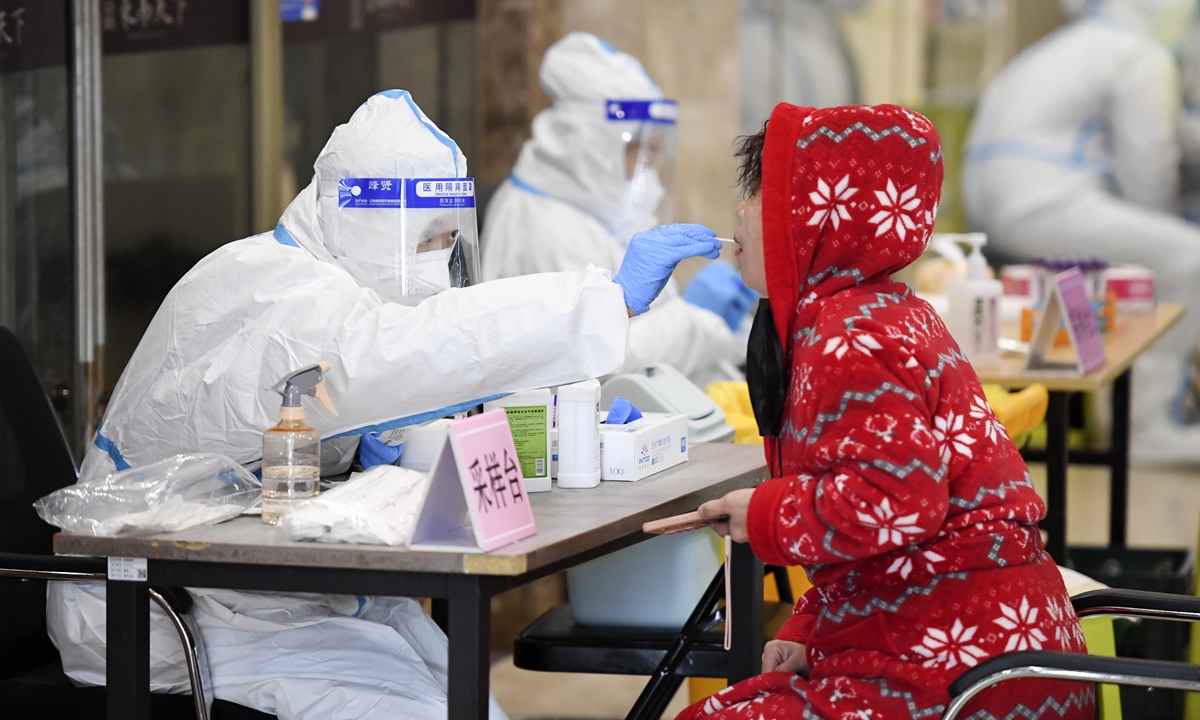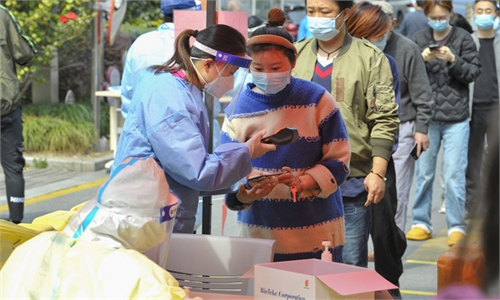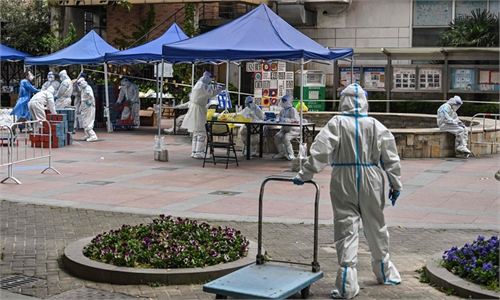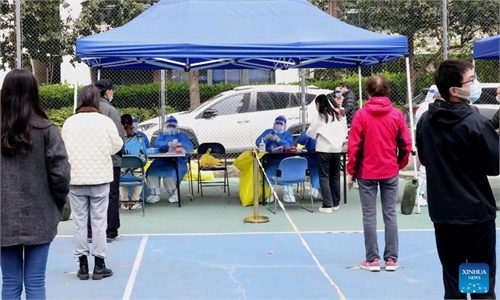‘Dynamic zero-COVID policy’ the only way out of current complex situation: Global Times editorial

A resident takes the nuceic acid testing in Changchun, Northeast China's Jilin Province on March 13, 2022 as the city has started a new round of citywide testing. Photo: VCG
Since March, the epidemic has been rebounding in many regions across China, with a wider scope and more frequent occurrences. The work on epidemic prevention and control is encountering the severest challenge China has faced in the past two years. Although as early as December 2021, North China's Tianjin was the first region in the Chinese mainland to deal with the Omicron variant, with the recent outbreaks in Northeast China's Jilin Province, East China's Shanghai and other regions, the complexity of the battle against Omicron has once again become prominent.Experts say the Omicron strain might be 10 times harder to contain than Delta. It means that to safeguard life and health, more efforts must be made. Previously, when dealing with the spread of Omicron, South China's Guangdong Province, East China's Shandong Province, North China's Hebei Province, as well as Jilin and other regions have taken strict prevention and control measures, such as quarantine, management, lockdown, and screening, which have led the situation to a positive trend. Practice has repeatedly shown that the key to winning the battle against the epidemic is to adhere to the general dynamic zero-COVID policy without hesitation and unswervingly implement the guidance to cope with the ravaging virus.
It is worth noting that some specious voices have come out at the critical juncture when China's epidemic prevention and control is facing difficulties. They advocated that "the Omicron is a big flu" and that countries such as the US and the UK are "successfully coexisting with the virus." In public opinion, they have tried to create a "prosperous scene" that Western countries have completely gotten rid of the interference of the epidemic, and they even regarded this as a victory of the West's "herd immunity." But these arguments are utterly groundless, morally and scientifically.
Due to Omicron's strong infectivity, fast transmission and reduced toxicity, some arguments such as "Omicron is just a big flu" have been widely circulated. But overseas data shows that Omicron can generate a higher mortality rate than Delta during the epidemic. WHO Director-General Tedros Adhanom Ghebreyesus recently said several countries are now seeing their highest death rates since the beginning of the pandemic. The basic national condition of China is that there are 267 million people aged 60 and above and more than 250 million children. The figure combined surpasses 500 million. Such a gigantic group of seniors and children determines that we must not "lie flat" in any form, but must stick to the dynamic zero strategy, take the initiative in the epidemic fight, and be strict in epidemic control. Only by doing so can we fundamentally avoid a large-scale rebound.
As a matter of fact, "coexisting with the virus" in countries like the UK and the US is nothing but a passive "lying flat" in preventing and controlling the epidemic. The so-called herd immunity essentially means to drive out a large number of the vulnerable people with low immunity. This is a cruel social Darwinism. In contrast, China has protected the elderly and the patients with underlying medical conditions, which is very remarkable.
Even with the cost in people's lives, the West is far from having beaten the virus. In the UK, for example, all prevention measures were lifted in March and the so-called coexistence mode was launched. But this was followed by a rapid surge in infections, huge pressure on the medical system and a shortage of workers to return to work due to the infections. Germany is aware of the seriousness of the problem and announced that it has revoked its decision to end the mandatory isolation policy from May 1. German Health Minister Karl Lauterbach even publicly admitted that he had made a mistake.
Practice has proved that dynamic zero-COVID policy is the best choice for China to fight the epidemic. The severer the epidemic, the more important it is to fully and accurately adhere to the dynamic zero-COVID policy. It is worth emphasizing that some places are causing complexities to people's normal lives, precisely because they have not implemented the dynamic zero-COVID policy, resulting in a series of problems. We need to fully and accurately adhere to the zero-COVID policy. On the one hand, we need to achieve a rapid response and precise prevention and control. We should ramp up efforts at the initial stage, trying to wipe out every case when it is identified. On the other hand, we should strive to maximize the effect of prevention and control at minimal cost, resolutely breaking formalism and bureaucracy, and minimizing the impact of the epidemic on economic and social development.
Over the past two years, it is just because of the firm adherence to the principle of people first and life first, and to the scientifically and precisely dynamic zero-COVID policy, that China has managed to maximize the protection of people's lives and health, while maintaining global leadership in economic development as well as epidemic prevention and control. In the face of the new round of severer tests, the Communist Party of China and the Chinese government have fully demonstrated their high degree of responsibility and pragmatic attitude by adhering to the dynamic zero-COVID policy. China's actions against the epidemic will surely stand the test of time and history.



